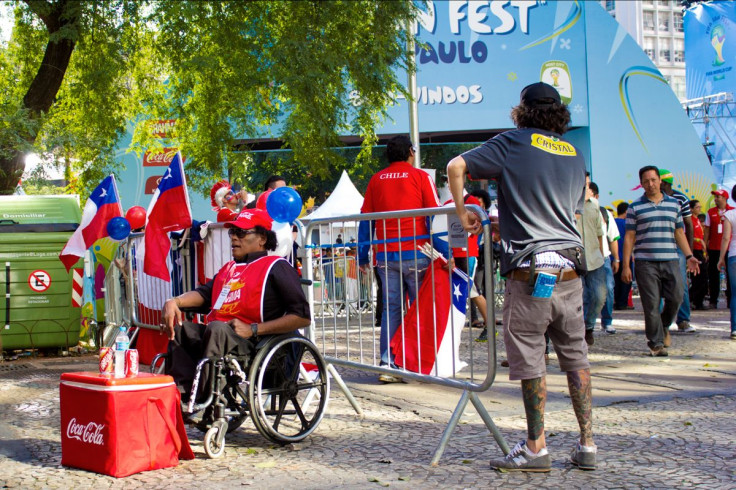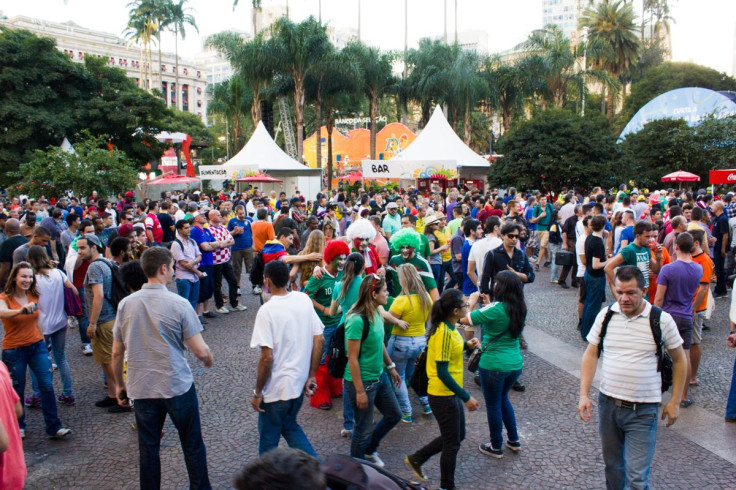Unintended World Cup Legacy: Prompting Illegal Street Vendors To Seek Legal Legitimacy

SÃO PAULO, Brazil -- Street vendors pushed yellow carts up and down Paulista Avenue in the banking district of Brazil’s largest city, laden with corn-on-the-cob steaming in pots of water. For $2.50, the vendors shaved the kernels onto a styrofoam plate, smothered the dish in melted margarine and dusted it with salt for hungry patrons.
It’s a culinary tradition that normally attracts white-collar commuters and retail workers. Now that the World Cup is in full swing, the vendors are serving lots of tourists, too. Business has never been better, unless the vendors get nabbed by the police, who treat such vending as a crime and seize whatever food or drinks they’re selling as contraband.
The World Cup has brought the disparity between Brazil's informal and formal economies to the fore, sparking protests and galvanizing the labor movement in hopes of legitimizing business enterprises embraced by the public yet technically outlawed.
“If you’re illegal and [the police] catch you, they take everything,” Valdina Andrade de Silva, a temporarily legal drink vendor working in the city center, said. Valdina, who is also labor organizer, is among an estimated 1,000 workers who have received special permits to sell drinks during the World Cup, and on Monday she hawked her goods as Brazil geared up to play Cameroon. Aside from the hundreds of fans in yellow jerseys who passed by, she was surrounded by a dozen other vendors wearing red bibs marked “official vendor.”
Human rights and labor groups have protested the World Cup for a variety of reasons, including its displacement of local workers, increasing sexual tourism and the gentrification of neighborhoods around the 12 host cities. But with small gains among vendors, Valdina hopes to secure permanent improvements in the way they do business. Her hope is that labor reform and regularization of informal workers will be among the legacies of the 2014 World Cup.
For now, “It’s a relief to be legal,” Valdina said as she lugged her icebox-laden dolly across the uneven stone street that encircles the FIFA-sponsored Fan Fest, a semi-public viewing area with a giant screen. A street vendor for more than 30 years, Valdina said she wants her work to be legalized after the Cup. Though street vending is not respected as a legitimate profession, she said, "these people are family people, supporting households. Many mobile vendors are immigrants, low-income people -- the type of people that need quick cash.”
Though precise numbers of informal street vendors are difficult to calculate, about 138,000 operate in the greater metropolitan area of São Paulo, according to estimates based on 2010-2011 data collected by the Interunion Department of Statistics and Socioeconomic Studies (DIEESE). Only 5,137 street venders have legal permission to work.
A few local food items were allowed to be sold after successful protests. According to Al-Jazeera, one major concession was gained from FIFA in Salvador, another host city, where vendors started handing out plates of acarajé, a traditional local dish that wasn’t offered by McDonald’s Corp. (NYSE:MCD), an official food sponsor of the athletic event. In São Paulo, a few caterers were subcontracted to sell pernil, a regional pork sandwich. But that didn’t do much for the majority of mobile vendors.
The additional 1,000 work permits assigned to approved vendors come with strict conditions to support FIFA’s sponsors. Recipients aren’t allowed to sell food, souvenirs or any products from non-sponsors. For drinks, that means Brahma and Budweiser, both owned by AmBev SA (BVMF:ABEV3), Coca-Cola Co. (NYSE:KO) and bottled water.

“I’d make so much more selling my own merchandise,” Edison Rosa da Paz, another long-time vendor, said. “They’re just hiring me to cover up the reality,” he said, pointing at the wheelchair in which he sat. Edison believes that by highlighting handicapped vendors in their branding, FIFA makes it look like it gave a new job to a man in need. Yet he already had a job, he argues, selling goods in the square now occupied by the walled-off Fan Fest.
“On a day where Brazil is playing, or there’s some other big game, I would normally make about 300 reals," he said. “On the 12th, (the opening day of the Cup), I made 18 reals. Of course, that was partially because of the ice. It got here late.” As Paz talked, a soccer fan wrapped in a Chilean flag approached and bought a beer. Of the 5 reals the fan pays, 1.5 would go to Edison.
Accustomed to working alone, buying his own ice and relying only upon himself, Edison was angry that his ice hadn’t arrived on time. Valdina said that the availability of ice is precisely one of the advantages of integrating with the system, of regularizing the vendors.
“They only brought half the ice the first day, but now it’s all settled,” Valdina said. “Really, it’s an advantage, because we usually have to get the ice ourselves, and now they bring it here for us, with the cans, too.”
The ice, soda, beer and water are kept in a set of refrigerators 200 feet from the Fan Fest entrance. Beside them is a table with spreadsheets, pens and a calculator. A woman notes down the beverage withdrawal of a vendor who’s just restocked. Behind the refrigerators, employees of AmBev, the drink distributor, stand behind temporary metal walls. At the center of this half-open room is a 13-inch TV screen with shoddy reception, distorted color and lines squiggling up and down the set, propped atop a pyramid of Coca-Colas stacked five cans high.
But more than the ice, more than the temporary licenses, Valdina thinks about the big picture. She mentioned StreetNet, an advocacy group based in South Africa that took on FIFA when the Cup was in that country four years ago. They fought to defend street vendors’ rights to sell around stadiums and Fan Fests. Building on that work, Valdina’s group of vendors worked with a legal aid and public policy group called the Centro Gaspar Garcia. They lobbied the municipality, which in turn negotiated with FIFA for the 1,000 temporary licenses. Valdina wants the street vendors legalized, to have them paying taxes, and to keep them safe from police, even after the World Cup is gone.
“This is the work of ants,” Crislane Moraes Santiago, a volunteer who came to oversee the new system, said. “We’re small and individually we don’t move many cans, but together we’re accomplishing so much for these companies.”
“We need to convince these companies that we are out here working for them everyday, and they should invest in us,” added Valdina.
As the game started, the men focused on the tiny TV propped atop the Coca-Cola pyramid. Across the street, thousands cheered inside the Fan Fest, watching a state-of-the-art LCD screen 50 feet wide.
Valdina pointed at the cheering people and said, “I’m fighting to one day be in there, with the crowd, and in the stadiums, too, to prove that I’m not a problem.”
© Copyright IBTimes 2024. All rights reserved.





















